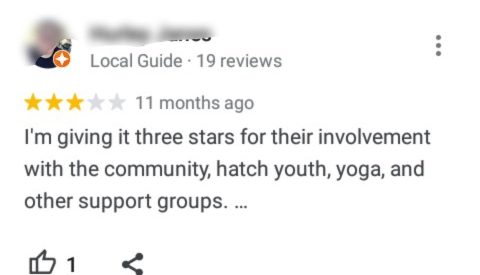Whether or not you want it to, it likely will.
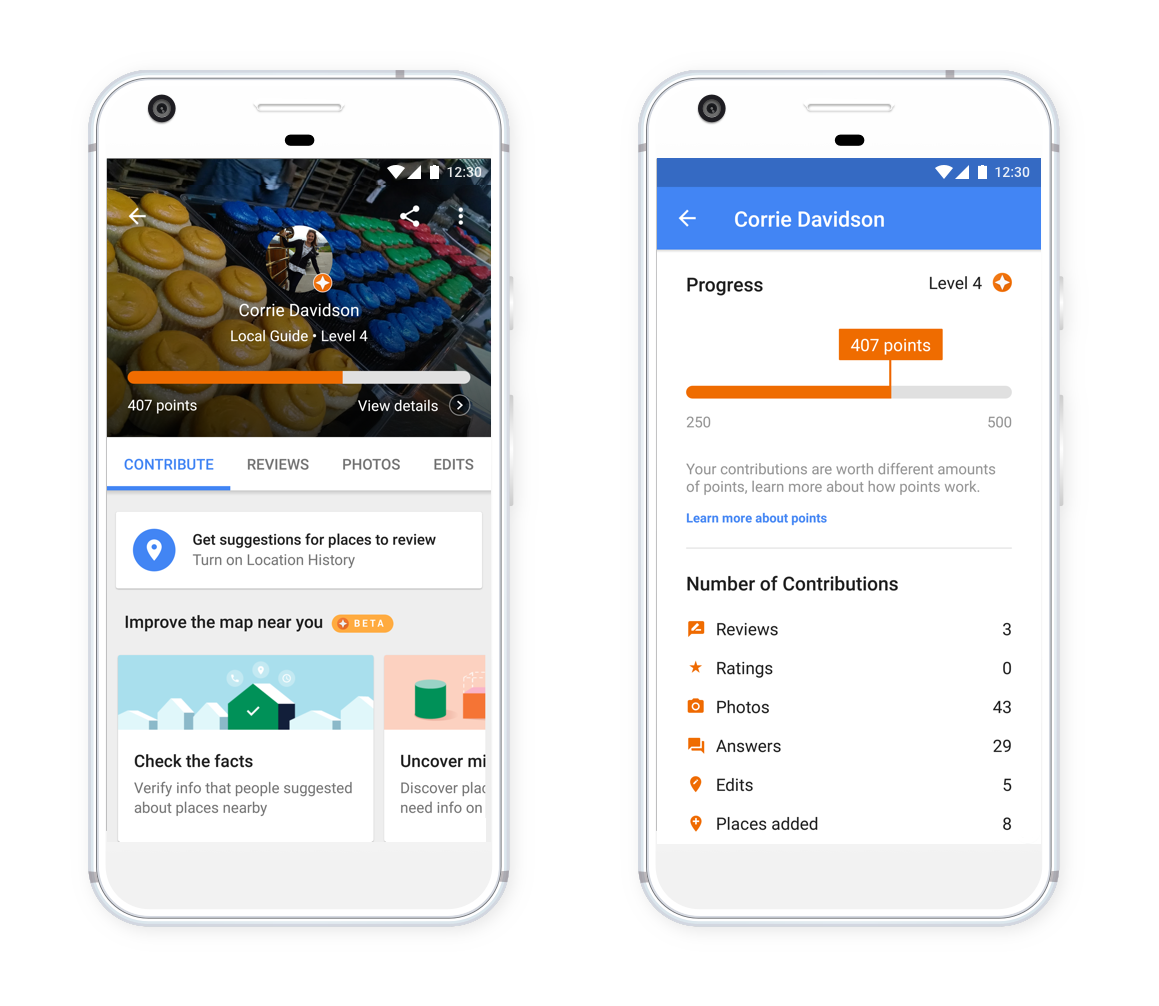 Google crowdsources much of its data collection; business owners are incentivized to create free Google My Business profiles, and users are also incentivized through the Google Local Guides program. Click the image to jump to the Local Guides homepage.
Google crowdsources much of its data collection; business owners are incentivized to create free Google My Business profiles, and users are also incentivized through the Google Local Guides program. Click the image to jump to the Local Guides homepage.
Disclaimer: Businesses may not sign up for the Local Guides program. My Local Guides profile/account predates the formation of my company, and I am diligent to not use that platform in ways that violate the Terms of Service. As a business owner, you can use a personal Google account (or Gmail address) to sign up as a Local Guide, but you are expressly prohibited from using a business email/identity to sign up as a Local Guide and the Terms of Service specifically addresses both reviewing your own business (not allowed) and conflicts of interest, i.e. ?don?t be evil,? which was Google?s actual corporate motto/ethos for many years.
What exactly is a Local Guide?
At search/local, I field this question a lot.
Typically, clients and prospective clients are asking because a review shows up on their business? Google listing that looks a little different, and ? often as not ? appears prominently among the various reviews.
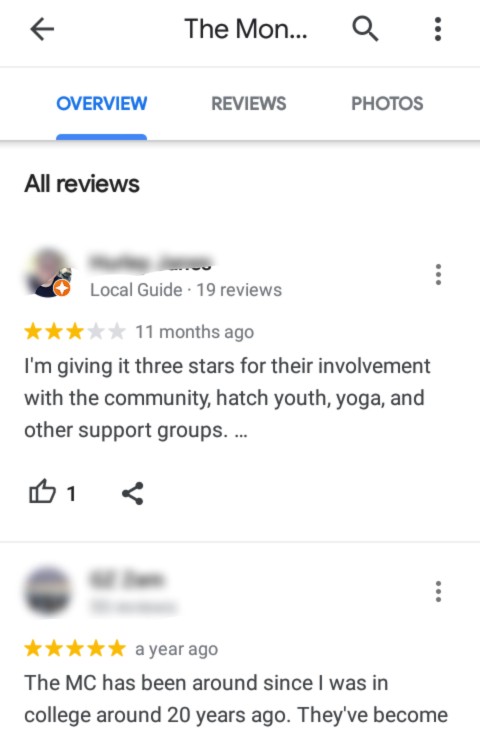 Anecdotally, many of my clients have pointed out that reviews from Local Guides seem to appear very prominently in their business? Google listing. As a user/contributor, I have also ? anecdotally ? seen weight or prominence given to Local Guide reviews.
Anecdotally, many of my clients have pointed out that reviews from Local Guides seem to appear very prominently in their business? Google listing. As a user/contributor, I have also ? anecdotally ? seen weight or prominence given to Local Guide reviews.
I can answer pretty definitively, too, because I am a Local Guide, and a big fan of the platform. Click the link below to jump to my Local Guides profile, if you want to take a look.
Contributions by Kevin M. Cook
Find local businesses, view maps and get driving directions in Google Maps.
www.google.com
In order to understand how Google Local Guides affect your business, you must first understand something fundamental about Google: they are all about crowdsourcing.
Google depends on its users to submit data that it then uses to personalize, localize and otherwise refine query results on Google Search and Google Maps. To a lot of my clients, one important takeaway is that anyone can ?suggest? edits to your business? listing, and if you are not diligent in updating and monitoring your Google My Business listing, those edits can be approved and go live, whether or not they reflect your business? actual information.
We?ve seen phone numbers changed, websites changed, business? illicitly claimed by non-business-owners, often in ways that appear to benefit competitors or online scammers; that?s the dark, seedy underbelly of Google?s democratization of information.
One way to think of the Local Guides program is as an effort to counterbalance the manipulation and misuse of its data-collection processes.
How it works:
In short, gamification.
If you?ve ever played RPGs, whether video games or old-school, analog RPGs like Dungeons & Dragons, you?re familiar with some of the elements of gamification. For Google Local Guides, those elements are points, levels and badges, the incentives that Google offers in exchange for data collection.
Take a look at Google?s explanation:
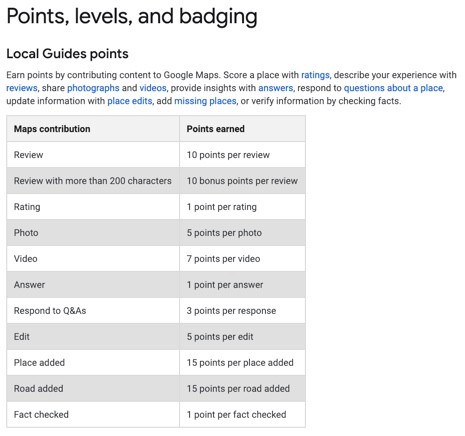
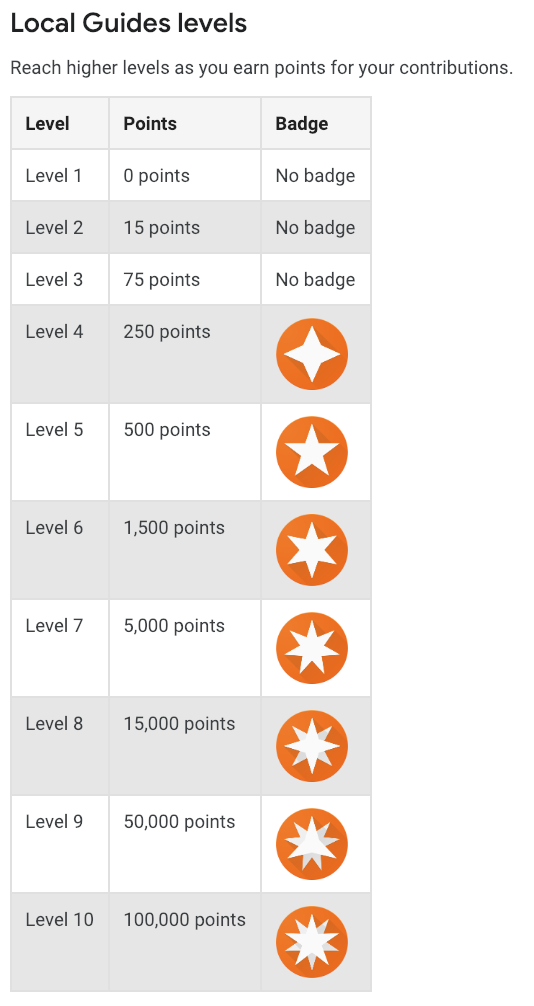 Click the image to jump to Google?s explanation of the points, levels and badges system they employ as incentives for the Local Guides program.
Click the image to jump to Google?s explanation of the points, levels and badges system they employ as incentives for the Local Guides program.
So users (Local Guides) ascend from Level 1 to Level 4 by performing any of the incentivized actions Google has listed, with a certain number of points assigned to each action.
Note how the system is self-correcting; ?fact-checking? is worth a point per fact checked. There are other self-correction mechanisms, too. Reviews longer than 200 characters (i.e. thoughtful, substantive reviews) are worth twice as much as a briefer review, which in turn is worth 10 times as much as a simple 1?5 star rating. Edits are worth points, as well, so diligent users who notice mistakes or gaps in Maps information are also rewarded.
At Level 4, Local Guides earn a visible Local Guide badge. That?s the circular, heraldic icon that appears next to the users? avatar (circular profile photo). You?ll notice that the symbol inside the badge is a reference to the user?s level, as well, and ? as a rule ? the more points a Local Guide has accumulated in the program, the more authoritative/trustworthy that person is.
It stands out ? and it?s designed to!
Who becomes a Local Guide?
Seven kinds of Local Guides you might spot on Google Maps
What kind are you? Satellites are famously effective for mapping, but they don’t take photos of must-have breakfast?
www.blog.google
Users become Local Guides for a variety of reasons. I obsessively take surveys. When YouTube offers up a pre-roll commercial that is a survey, I get excited.
Why?
I have been on the other end of the transaction. I?ve been a marketer, desperate to know more about my target demographic or potential customers. On the user end, I think of it as making my voice heard; voting, in a sense.
In the same way, Local Guides have a profound, observable impact on Google Maps results, which influence a lot of people. I have been on a months-long pilgrimage to all of Houston?s public libraries, where I take photos and video (never without asking staff first, and never with civilians in frame) and leave a review of that specific HPL branch. I?m really into libraries ? I love the free services and classes and space they provide for their communities.
So as a Local Guide, I praise HPL branches that ? relative to their sister branches ? provide an especially good space for patrons, hold branches accountable when they provide those vital services I care about poorly, and in general, my reviews (in the aggregate) help bring visibility and clicks to HPL.
What do Local Guides get in return for all the free work?
Great question! And the answer is that, while a lot of us would do this for free (I would!), Google also offers incentives at various levels of the program, called ?Perks.?
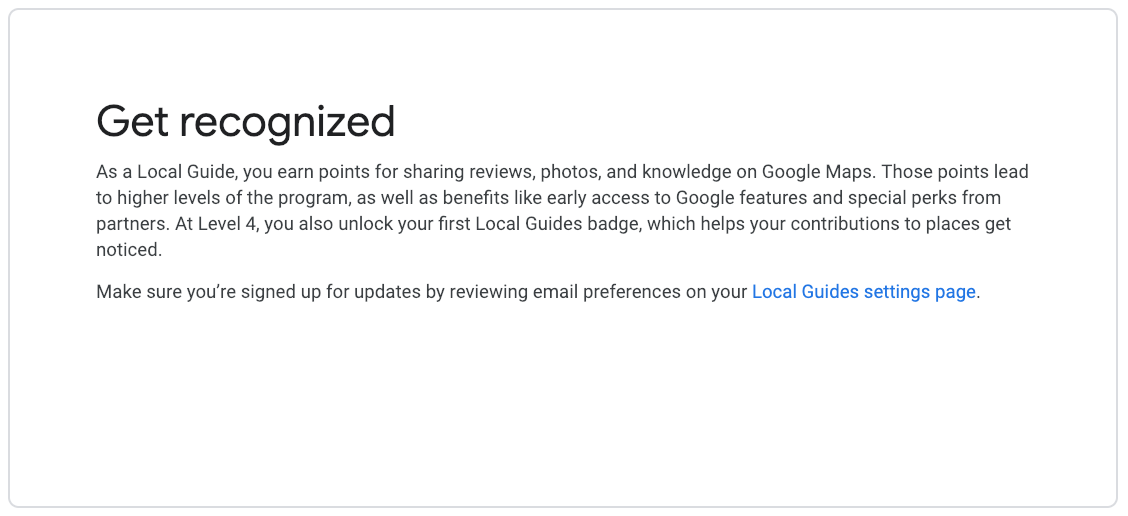 Google doesn?t detail specifically what perks it offers, because they are often in flux. Many Local Guides have received 3 months of free storage (100GB) on Google One, and free Google Play trials, movie rentals and other incentives have been offered to Local Guide users.
Google doesn?t detail specifically what perks it offers, because they are often in flux. Many Local Guides have received 3 months of free storage (100GB) on Google One, and free Google Play trials, movie rentals and other incentives have been offered to Local Guide users.
The incentives aren?t enormous, but they?re there; typically, they cost Google very little or nothing. The hope is that, in return, they are provided with otherwise unthinkably large quantities of accurate, high-quality data that it uses to power Google Maps, feed Google Search, etc.
Take a look at my very real, personal Google Local Guides profile:
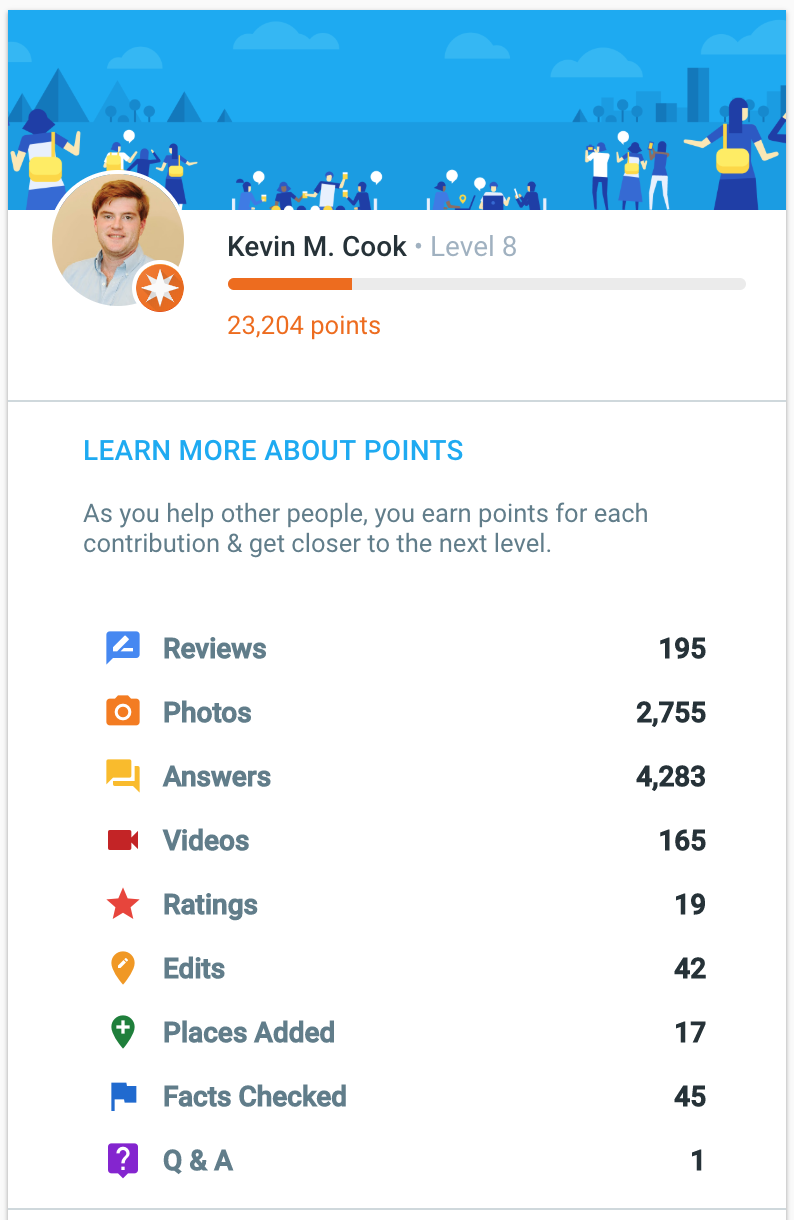 Colorful, isn?t it? Google?s design scheme is the result of careful deliberation, measurement and execution; their goal is to build a platform that is fun to use, because ultimately, what they?re asking users to do is work for them for free. That?s a cynical perspective, but it?s not entirely inaccurate.
Colorful, isn?t it? Google?s design scheme is the result of careful deliberation, measurement and execution; their goal is to build a platform that is fun to use, because ultimately, what they?re asking users to do is work for them for free. That?s a cynical perspective, but it?s not entirely inaccurate.
Also, it?s worth looking into the subtler elements of gamification and incentivization that Google weaves into the Local Guides program. There is one ? and only one ? email that I wait for every month, the way some people look forward to movie trailers or a wine-of-the-month club delivery.
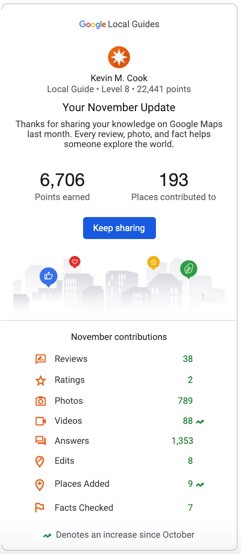
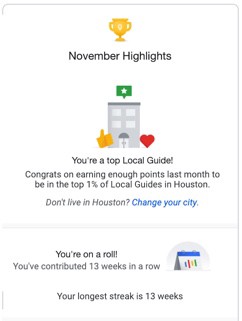
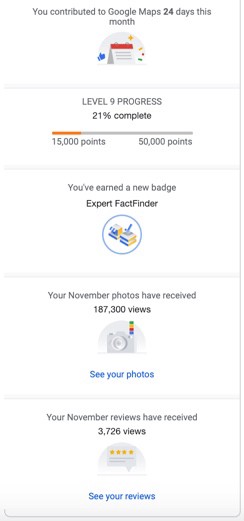 Note how every element of this email is colorful, interactive and gently celebrates the Contributions I made while pushing me to ?Keep sharing? or ?Contribute more.? Why am I so excited to get this email every month? Because, like everyone else, I?m a sucker, and the reward of seeing my impact/reach quantified in bright, pleasing colors is exciting.
Note how every element of this email is colorful, interactive and gently celebrates the Contributions I made while pushing me to ?Keep sharing? or ?Contribute more.? Why am I so excited to get this email every month? Because, like everyone else, I?m a sucker, and the reward of seeing my impact/reach quantified in bright, pleasing colors is exciting.
As Local Guides add more content (fact-checked and verified by other aspiring Local Guides), they also earn specific, themed badges. And speaking as someone who obsessively took photographs of every location of interest I chanced upon over the past four months to the point of annoying my friends and family (not that much, I hope), solely to earn my ?Master Photographer? badge ? they?re an effective incentive.
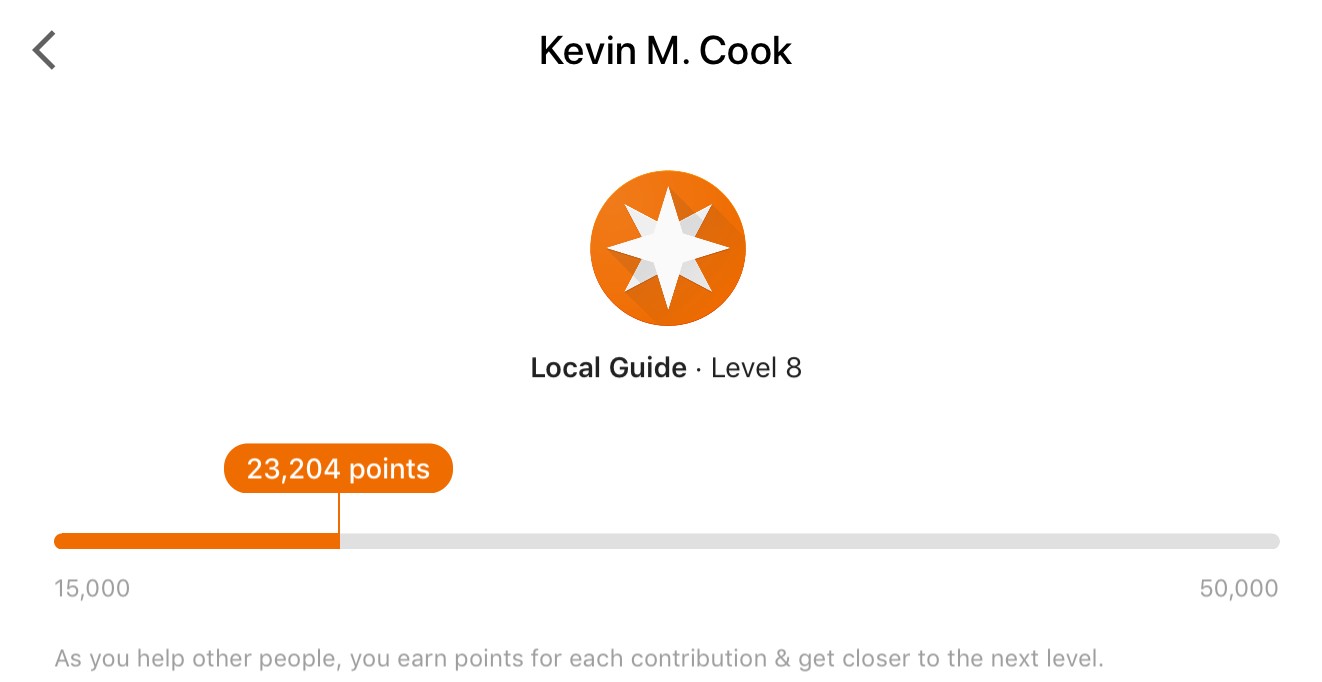
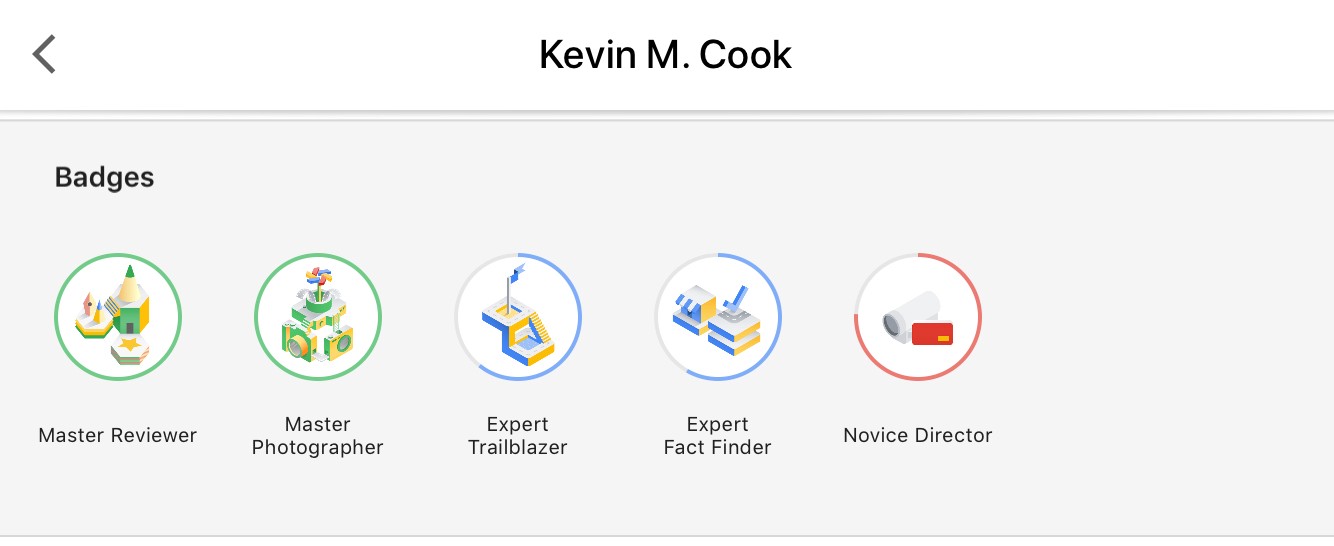 The green badges in the righthand image represent topped-out objectives, not unlike a video game. Despite the fact that I had uploaded literally thousands of photos, until I earned the ?Master Photographer? badge, I went out of my way to take photos for Google Maps, generating considerably more content for the platform than if I had not been incentivized with that badge.
The green badges in the righthand image represent topped-out objectives, not unlike a video game. Despite the fact that I had uploaded literally thousands of photos, until I earned the ?Master Photographer? badge, I went out of my way to take photos for Google Maps, generating considerably more content for the platform than if I had not been incentivized with that badge.
Look at the amount and variety of content it took for me to reach those badge levels (which I?m obviously embarrassingly proud of ? a testament to Google?s thoughtful design and gamification and/or my own innate nerdiness):
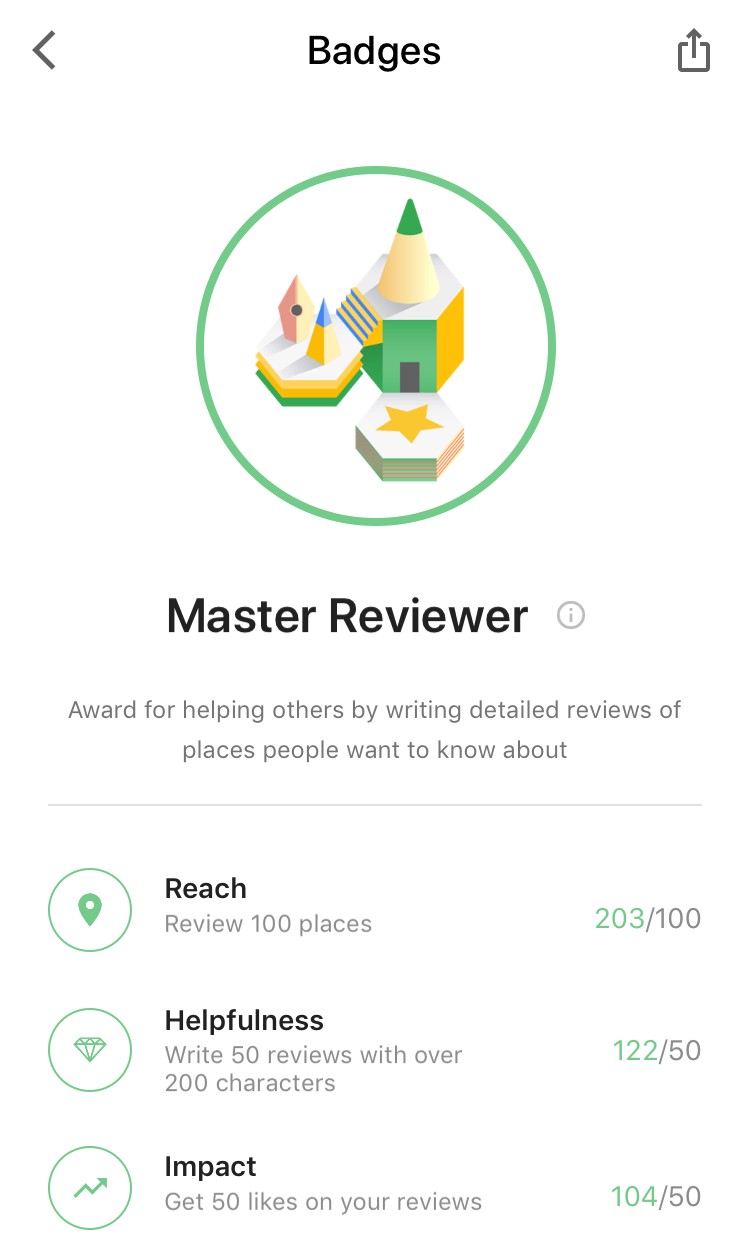
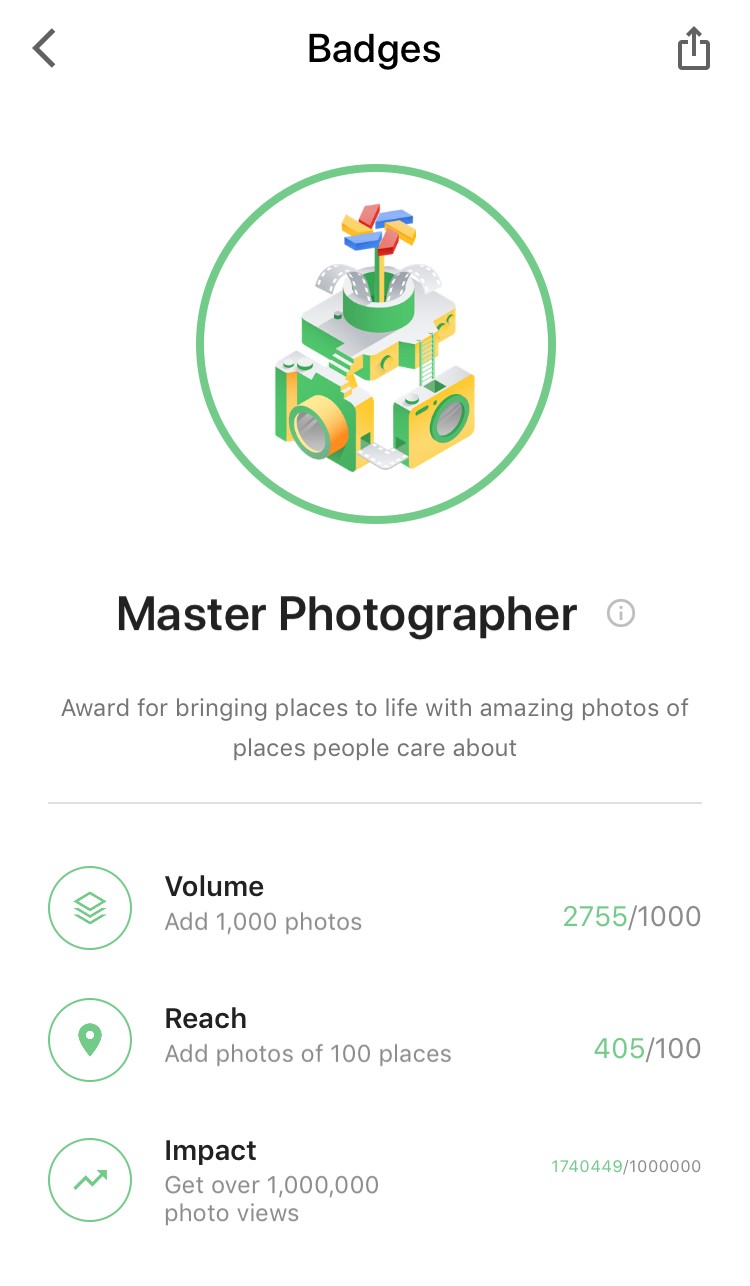 Consider the implications of the multivariate badge objectives: they encourage quantity, quality and relevancy (impact/engagement).
Consider the implications of the multivariate badge objectives: they encourage quantity, quality and relevancy (impact/engagement).
Those badges aren?t easy to get. And by the time Local Guides become Master Anythings, they have generated a lot of valuable, useful content that Google uses to power Search, Maps, etc.
And we talk amongst ourselves, too, through Google Local Guides Connect. That?s where your business and Google Local Guides can potentially intersect.
The Local Guides Terms of Service and user guidelines specifically prohibit businesses creating Local Guide accounts, and strongly discourage (or penalize) attempts to deliberately game the system. I always always recommend clients familiarize themselves with Google?s rules, and furthermore, make every attempt to honor the spirit of the law, rather than the letter of the law.
That?s not because I?m a Boy Scout about marketing small businesses. I?m not. I like to think I?m practical/pragmatic, and that I live and work in the real world.
Google is diligent about policing its platforms, though, and it will probably not surprise you to find out that some of the moderation and enforcement relies on crowdsourcing, too: users can ?flag? (report) a Google Review if they believe it violates the Terms of Service, calling Google?s attention to the content in question. Additionally, Google is constantly updating its algorithms and automated processes to improve the quality of the results it serves.
What does that mean in real-world terms? Well, on May 24th 2018, a wide swathe of businesses noticed something weird about their Google Reviews ? specifically, that the total quantity dropped substantially, seemingly overnight.
Where Did Your Google Reviews Go?
Leaving a review on a Business Page on Google means you have to have a Google Account. Users are finding the number of?
www.bigredseo.com
That?s only one example: Google is constantly refining their processes and data, and it?s my firm opinion that ?black-hat? SEO (exactly what it sounds like) and other attempts to manipulate the system are ? over time ? doomed. They might (and do) ?work? in the short term, but in the long run, skirting the rules doesn?t yield a good ROI.
So what about my business, then?
Without breaking (or ?bending?) the rules, there are still ethical, ToS-abiding ways to engage the Local Guide community, and thereby benefit from this base of content-generating super-users.
For one, creating a frictionless, one-click link for customers to leave a Google Review is a good idea for any business, and thankfully, Google makes that pretty easy with the PlaceID Lookup Tool.
But because Local Guides are already an especially engaged, motivated group of users, there is another way to engage with them: Sponsored Meet-Ups.
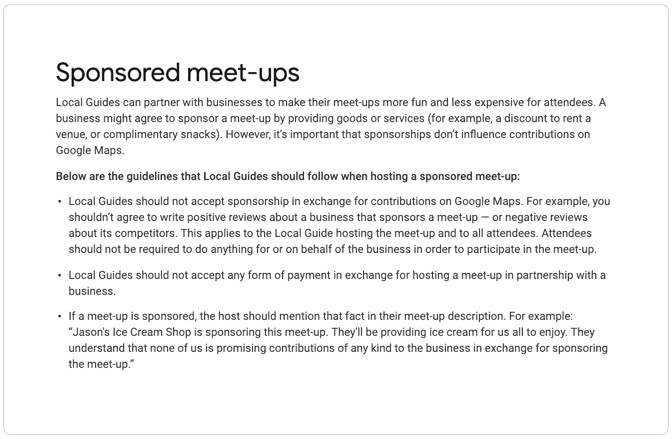 Click the image to jump to Google?s documentation on Sponsored Meet-Ups.
Click the image to jump to Google?s documentation on Sponsored Meet-Ups.
Although the language is tailored to the Local Guides user, we can extrapolate some important guidelines and tips:
- Businesses can?t be Local Guides, but they are free to partner with Local Guides in order to improve the quality of Meet-Ups.
- You can contribute to the event as a business (discount rates for the event/attendees, free product or fare, etc.), but that contribution cannot be made to influence or encourage reviews; i.e. if you own a roller rink, you can rent the rink out at a radically-reduced (or free) price to the Meet-Up, but you cannot stipulate that the attendees leave you a review, or what type of review.
- Corollary: Local Guides like to leave reviews, take photos, etc. as we?ve discussed. That?s the advantage of hosting such an event; you?ll get a very influential, valuable, engaged group of super-users into your business who likely don?t need to be encouraged to generate the kind of content you?re hoping to get for your business.
- No payment of any kind should go to the event organizer; there is a good rule of thumb with Local Guides: if the user is attempting to monetize their involvement on the platform, they are almost certainly violating Terms of Service.
- Local Guide Meet-Up organizers are explicitly instructed to name the sponsor of a Sponsored Meet-Up in the title of the event; even if a Local Guide can?t make it to the specific event, they?re considerably more likely to be aware of your business just because they saw the event listing. Regular Sponsored Meet-Ups help convey that a business is aware of the community, and we Local Guides appreciate businesses that make an effort to bring us in.
- Be aware of what Local Guide behavior looks like, and try not to freak out; typically, Local Guides are supposed to consult with staff/employees before they start snapping pictures and taking video, but for a variety of real-world reasons, that doesn?t always happen. Someone shuffling around your storefront quietly recording with their phone could be casing your establishment, but more likely, they?re a Local Guide, performing tasks that are ultimately helpful to your business. Be safe, responsible and diligent, but also be sure not to alienate or antagonize Local Guides.That said, if a Local Guide is acting inappropriately in any way (for instance, taking photos that include other patrons without their permission or consent), by all means politely redirect them or ask them to stop doing so.
Learn by Doing
Here?s what I recommend to my clients at search/local HTX: learn by doing.
You aren?t permitted to use the Local Guides program on behalf of your business, or in a way that attempts to consciously, deliberately influence the quantity or quality of your business? reviews/ratings, but you?re not prohibited from using the platform as a private citizen.
I?ve gotten most of my feel for how Google?s Local Guides program affects small businesses from being a Local Guide and patronizing local businesses.
Most entrepreneurs and small-business owners that I encounter are learn-by-doing types, and fortunately, the Local Guides platform is very learn-by-doing user friendly (so long as you don?t venture into conflicts of interest).
Have you held a successful Sponsored Meet-Up for your local business? If so, leave a response detailing how it went and what you learned. We?d love to hear about it!
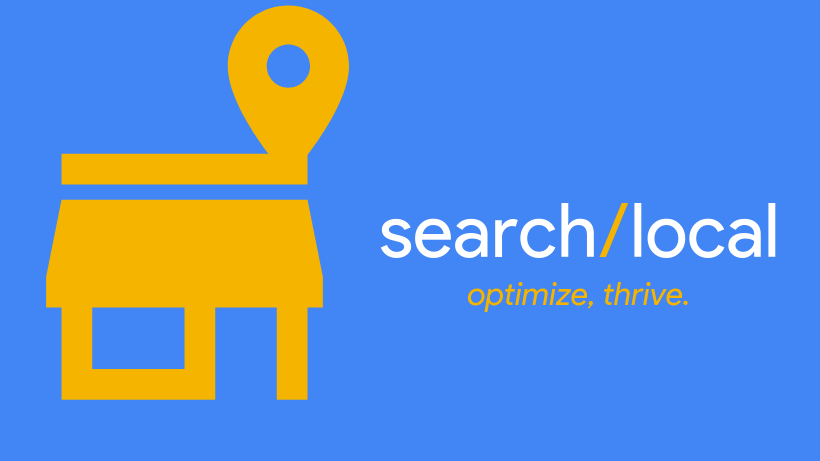 Do you have more questions about the Google Local Guide program and/or holding a Sponsored Meet-Up? Click the image above to jump to search/local HTX?s Facebook page and shoot us a message!
Do you have more questions about the Google Local Guide program and/or holding a Sponsored Meet-Up? Click the image above to jump to search/local HTX?s Facebook page and shoot us a message!
